#mary shelley's 1816 journal
Explore tagged Tumblr posts
Text
BTW, over the summer i made a bunch of posts about this stuff on the anniversary of the lake geneva 1816 summer trip. if you search my blog for the "shelley and byron's sailing trip" tag (about the solo trip mentioned here), the "mary shelley's 1816 journal" tag, or the more general "lake geneva 1816" tag, you can find them!
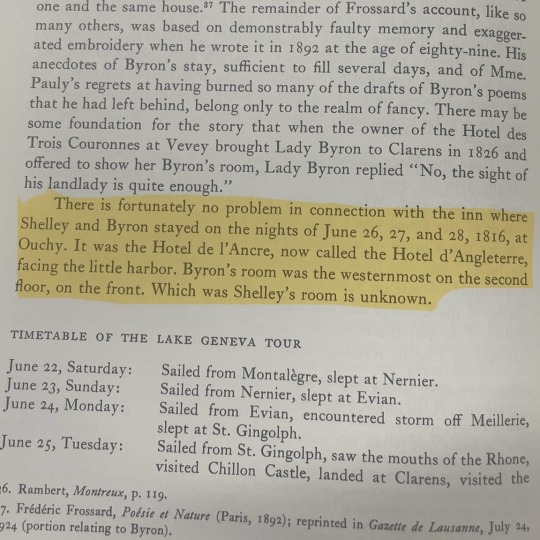
and they were roommates!
source: shelley & his circle: vol 4 (pforzheimer, 1961)
#for ease of access:#lake geneva 1816#shelley and byron's sailing trip#mary shelley's 1816 journal#lake geneva#the geneva squad
38 notes
·
View notes
Text
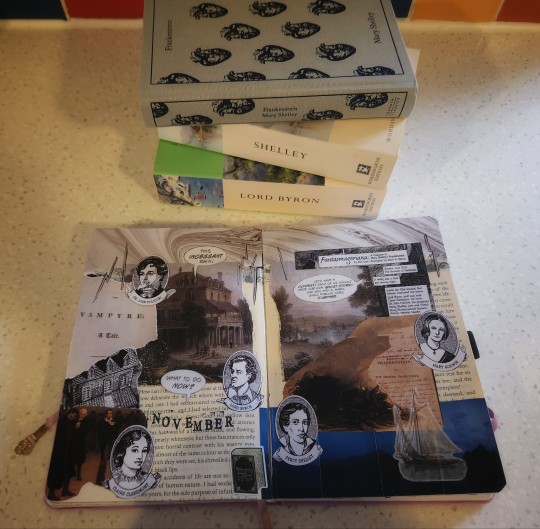

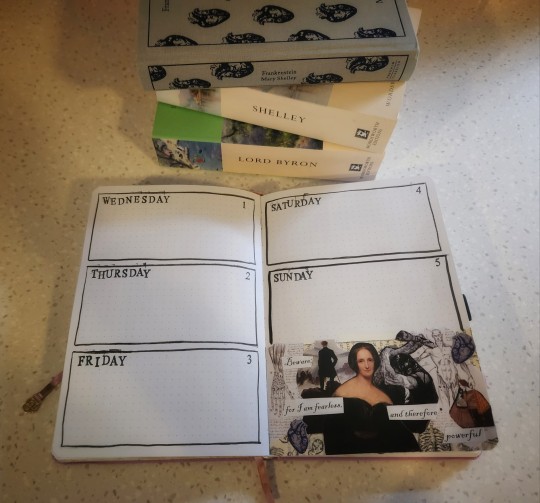
My bullet journal for November. Did something a little different this time.
If youve been following me for a while then you'll know i love Mary Shelley and her contemporaries, especially those who were with her at Villa Diodati in the summer of 1816. But in the last week or so i've been particularly drawn to them. I read The Villa by Rachel Hawkins which is partly inspired by the Villa Diodati gang and havent stopped thinking about them since.
Doing a Romantic Era poets theme has been in the back of my head for a while but this is the first time i've actually thought of a way to do it and i'm pretty happy with how its turned out! Each week will feature a different member of the group but of course Shelley herself had to be first!
#my art#my bullet journal#bullet journal#bullet journal inspo#mary shelley#frankenstein#romantics#romantic era#villa diodati gang#percy shelley#lord byron#claire clairmont#john polidori
47 notes
·
View notes
Text
Mary, Anne Eekhout
Rentrée littéraire 2023
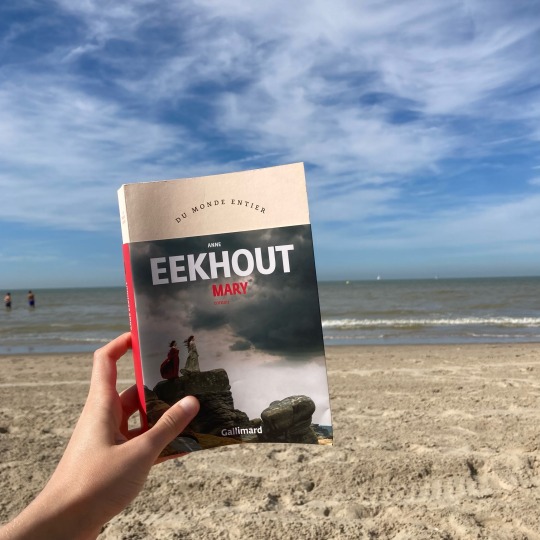
Mary avant Mary Shelley… Quand j’ai vu ce roman d’Anne Eekhout avec mon repré il y a deux mois à la librairie, j’ai crié, j’avoue. J’aime trop les romans qui mettent en scène des auteur.ice.s. Ici, on suit Mary Shelley sur deux temporalités : en 1812, alors qu’elle a 14 ans et qu’elle séjourne chez des amis de son père en Écosse, où d’ailleurs elle se lie d’amitié avec Isabella, à peine plus âgée ; et en 1816, sur les bords du lac Léman en Suisse, lorsqu’elle y passe du temps avec son mari Percy et leurs amis lord Byron et John Polidori.
Dans Mary, on alterne les dates et les styles d’écriture : en 1812, on suit les aventures de Mary jeune fille écrites à la première personne comme si elle écrivait son journal, et en 1816, on redécouvre une jeune femme en proie à une profonde mélancolie, et en plein deuil. J’ai trouvé le contraste entre les deux parties très intéressant, d’autant plus que toutes les 50 pages à peu près on alterne, ce qui rend le tout bien rythmé. Et au-delà d’être un roman sur Mary Shelley, c’est avant tout un roman sur Mary, sur une femme du XIXe siècle qui a du mal à trouver sa place dans un monde d’hommes, qui a pour seule véritable amie son imagination débordante et son goût prononcé pour l’horreur, le gothique et les monstres. Sur cette jeune fille mal dans sa peau qui va se lier fortement avec une personne de son âge ; sur cette jeune femme en proie à une immense tristesse après avoir perdu son premier enfant. J’ai adoré l’ambiance gothique et fantastique qui s’installe peu à peu dans le dernier tiers du roman, et qui amène le lecteur à se demander si ce que vit et voit Mary est réel ou le fruit de son imagination… Mais je ne veux pas trop en révéler. J’ai adoré ce roman, d’autant plus que je connaissais très peu de la vie de Mary Shelley. Ça m’a donné envie de relire Frankenstein !
Sortie le 7 septembre en librairie
01/09/2023 - 04/09/2023
#livres#books#livre#book#littérature#littérature néerlandaise#littérature étrangère#mary#anne eekhout#mary shelley#éditions gallimard#rentrée littéraire#rentrée littéraire 2023
0 notes
Note
Any good resources you can recommend to learn more about the inspiration for you musical?
Yes! Here's a list to get you started- each title will link to a place to read or buy the thing!
The Clairmont Correspondence
These are a collection of Claire Clairmont's letters. I wanted to be true to her voice, as she is often the most muted in many adaptations of the story- and it is really her story, more than anyone else's.
The Letters and Journals of Lord Byron
Some Unpublished Letters of Mary Shelley
The Life and Letters of Mary Shelley
The Correspondence between Byron and Percy and Mary Shelley
Though Claire's letters were the most important to me, I also gathered a lot of character info, dialogue inspo, and plot points from the letters of Byron, Mary, and Percy. There's some overlap in these, but it's still worth it to read everything.
The Diary of John Polidori
John is a very insular character, and most of his presentation in the musical is self-reflection. So, I had to read his thoughts. And boy, the guy was depressed AF.
Then, there are the various stories told within the show... get ready for this:
Don Juan
Le Morte Fiancee & The Family Portraits, from Fantasmagoriana
Christabel
Darkness
Fragment of a Novel
The Vampyre
A Hymn to Intellectual Beauty
Frankenstein, or, the Modern Prometheus
Note that for the Frankenstein text I selected, I chose the original 1818 text, purely because this is the original, the least edited, and in my opinion, the best. Far too many people only know the 1831 version, which is so far removed from that original summer I feel it is irrelevant.
This Article from the New York Times that was totally viewable back when I actually started researching for this show back in 2015 without a subscription so here's the web.archive link yo
After my dad suggested this story as the basis for a show to me back in 2015 (my god, 8 years ago???) this article was the very first thing I read about the Shelleys and Byron, and their summer at Diodati, and it got me hooked. I recommend giving it a read. It's great writing, and the sort of thing that NYT no longer writes nearly frequently enough anymore.
I immediately purchased the following three books, cited as sources by that article:
Byron in Love: A Short Daring Life
Young Romantics: The Shelleys, Byron, and Other Tangled Lives
Byron and the Romantics in Switzerland, 1816
Followed by like... hundreds more books, articles, etc. But those three are a great start! If anything, I'd add this book, purely because it's more well known and referenced than those three, and takes a more Byron-centric view that, well, gels more with the portrayal of events in my show.
Thank you for this question! I'm going to post this list on my Patreon as well, where I'll go more into detail on each resource. :)
#ask me about my musical#ask me about anything#my musical#musical theatre#musical theater#theatre#theater#musical#musicals#music#my patreon#patreon plug#shameless lol#anyhow#more tags#lord byron#mary shelley#percy shelley#claire clairmont#john polidori#frankenstein#don juan#vampyre#the vampyre#fantasmagoriana#christabel#diodati#villa diodati
23 notes
·
View notes
Text
Hey not to be that guy but this is just factually incorrect.
Mary Shelley did not fuck on her dad's bones. Matilda was written between 1816 and 1820 and her dad died in 1836. She did have sex with her future husband out of wedlock for the first time in the graveyard her mother was burried in, but we can't confirm it happened on her mother's grave.
She also kept extremely detailed journals of her life, so the implication that her father traumatized her in an incestuous way I think isn't a correct conclusion to imply here. That being said, you should read about the details of her life because it is fucking bonkers.

mary shelley writes frankenstein, dedicates it to her father (william godwin, not percy shelley), then writes mathilda, about predatory incestuous desire, and her father "suppresses" it. mary shelley also has sex on her parents' grave. there's no thesis to these observations, just that...mary literally was masterful at allegorizing and writing about her trauma, but she was also like. a regular person who did crazy cool shit like fuck on her dad's bones to idk. heal? in a strange sort of way? just be weird about it? i just. i love her dearly. i wish i could have known her. she might be the one historical figure i wish i could actually talk to.
159 notes
·
View notes
Text
Frankenstein and the Monster

So there is loads of speculation on a connection between Dabi and Frankenstein’s monster. There are several people who have already commented on it, here, here, and even here. (These are all the ones I could dig up recently). Frankenstein is a novel that can be read in many ways, but I believe the themes of the novel parallels and helps illustrate the relationship between Ujiko, Endeavor and Dabi.
1. Endeavor and Victor Frankenstein
To very briefly touch upon the novel for those who haven’t read it, there are several differences between Boris Karloff’s movie depiction and the original novel. In the novel the creature is intelligent, well spoken, and a reflection of the Doctor Frankenstein himself. To summarize quickly, Frankenstein a very dramatic undergrad student discovers the secret to reviving the dead, uses that to create a monster, then upon seeing how ugly it is flees. The monster grows up in isolation, is spurned by every human he comes across, and then returns to his master and says he will kill everyone the Doctor Loves unless he creates him a mate. Frankenstein destroys the mate, and then the monster destroys his wife to be on the night of their wedding then they chase each other around in the arctic until both of them die. If that wasn’t a sufficient enough summary, this crash course video is a good writeup of the book and it’s themes.
Frankenstein has a lot to say about science and treading in god’s domain, but it’s also written by a woman who was a teenager at the time (Mary Shelley) who existed in a soical circle of adult men who were much older than her. Just as much as it’s a novel about mad science gone wrong, there are strong themes of feminism, parenthood, and abuse intertwined in the novel.
Another popular reading is to interpret “Frankenstein” autobigraophically, a reading that was encouraged via 1970s feminist criticism of the novel. Earlier readings along those lines centered Frankenstein as a tale of monstrous birth and look to Mary Shelley’s own experiences with birth, which were pretty terrible.
Mary Shelley’s mother died when giving birth to her, and Mary and Shelley’s own first child, a daughter, died when she was just a few weeks old. And in her journal Mary recounted an incredibly sad dream about this daughter. “Dream that my little baby came to life again; that it had only been cold and that we rubbed it before the fire and lived.” [Crash Course: Frankenstein]
This is just some background information to add context to your reading. Percey Shelley first met Mary when she was 14, and eloped with her when she was 16 and already pregnant with his child (he was around 24 at the time). Not only that but Percey was married at the time when he eloped with Mary, and his wirst wife did not take it well.
Harriet (Westbrook) Shelley was Percy Shelley's first wife. While he was still married to her, he ran off with Mary Shelley, leaving Harriet pregnant and alone with their first child. She committed suicide on November 9, 1816 by drowning herself in Serpentine. [x]
As I said these details are all to add context to Mary Shelley’s life while she was writing Frankenstein. A book in which most of the female characters are severely mistreated and harmed.
There are some pretty feminist critiques to Frankenstein. For instance, the novel clearly shows what harm comes to women (and family and relationships) when men pursue single-minded goals. In fact thanks to Victor’s lack of work life balance pretty much all of the women in this novel die. Victor’s creation of the monster leads to the hanging of the servant Justine the murder of Victor’s bride Elizabeth on their wedding night. [Crash Course: Frankenstein]
To put it as frankly as possible (Haha, get it because frankenstein) there are several points in the novel in which both Victor and Frankenstein act like fuckboys.
You could easily read the story as one of male entitlement. Victor in the first place, deliberately refers to his bride to be Elizabeth as a possession and says it as a term of affection.
And when, on the morrow, she presented Elizabeth to me as her promised gift, I, with childish seriousness, interpreted her words literally and looked upon Elizabeth as mine—mine to protect, love, and cherish. All praises bestowed on her I received as made to a possession of my own. We called each other familiarly by the name of cousin. No word, no expression could body forth the kind of relation in which she stood to me—my more than sister, since till death she was to be mine only.
His actions towards Elizabeth in the novel are also, extremely neglectful. Elizabeth spends the novel passively waiting for him to return and marry her, but Victor has a habit of disappearing from her life for long periods at a time with no contact at all in pursuit of his endeavors. (Get it because I’m comparing Victor to Endeavor).
Elizabeth is someone he feels entitled to own, and entitled to her love (he literally thinks his parents gave him to her) and yet Victor never takes responsibility for Elizabeth and her feelings too wrapped up in his own. When Elizabeth is grieving for the losses of her family, Victor has a tendency to leave her alone to go off to sulk on his own. Elizabeth even pleads multiple times for Victor to come home, to offer some support for the rest of the family with his mere presence and Victor delays these returns home as long as possible.
“Get well—and return to us. You will find a happy, cheerful home and friends who love you dearly. Your father’s health is vigorous, and he asks but to see you, but to be assured that you are well; and not a care will ever cloud his benevolent countenance.
This treatment also extends to the rest of Victor’s family, who are people he seriously neglects throughout the novel, and also people who are the direct sufferers of the consequences of his actions. His youngest brother is killed, the maid is framed for the murder, Elizabeth dies on the wedding night, Clerval his closest friend is killed, and his father dies soon afterwards of old age / implied grief.
The monster who Victor creates is also a reflection of him. After knowing the suffering it is to be created as a creature with no family, and no place of belonging he then instructs Victor to make him a woman. A woman that will have no choice but to love him because they will be the only two alone in the world. The monster, also feels entitled to feminine love because he is lonely, with no thought to whether or not the second monster might have feelings, opinions or her own, or might not even like him.
“You must create a female for me, with whom I can live in the interchange of those sympathies necessary for my being. This you alone can do; and I demand it of you as a right which you must not refuse.”
The recurring theme is this: a sense of male entitlement, without a sense of responsibility. What do I mean by Male Entitlement?
Male entitlement is a product of traditional societal norms. It is cultivated in men as they join a society which usually favors them over the other genders in their careers, relationships, character-standing, and more. There’s more on it here, and the role of male entitlement in abuse.
Male entitlement is an attitude where men believe they are entitled to power over others, and/ or ownership of the women and children in their lives. Victor calls Elizabeth a possession given to him, and neglects her throughout most of the book. The monster believes he deserves to have a woman to love him. It’s not masculinity. Masculinity is just masculinity. It’s the belief that they are entitled to power or ownership over others simply because they are men born in a society that favors men. Male entitlement can show up in say, a father who believes he is entitled to the love of his children despite never doing any of the actual work of childrearing and pushing it all on the mother. Believing they deserved to be loved simply for being a father, while being absolutely absent for their lives. GUESS WHAT HAPPENS IN FRANKENSTEIN.
So, a lot of people interpret Frankenstein as a story of ambition gone wrong, but that interpretation feels like it’s missing something if you don’t include the feminist angle. Frankenstein when doing his mad scientist undergrad bit speculates how he would be a father of a new species. It is specifically, fatherhood accomplished without a mother. That this new species would owe him love.
A new species would bless me as its creator and source; many happy and excellent natures would owe their being to me.
An undeniable part of Victor’s motivation is that as the sole creator the child would owe him all of their love. I mean to once again connect this to abuse narratives how many real life parents believe their children have to love them no matter how poorly they treat them?
No father could claim the gratitude of his child so completely as I should deserve theirs.
Victor in the novel wants not only fatherhood, but also motherhood. He wants to create life which in victorian society at the time is the role of the woman. And yet at the same time, he doesn’t want to do any of the actual work of motherhood and the roles typically described to women.
We can read the novel as an exploration of what happens when men fear, distrust, or devalue women so much that they attempt to reeproduce without them. In some ways Victor is trying to bypass the feminine altogether. He’s creating life without recourse to egg or womb. [Crash Course: Frankenstein]
Victor creates, and then proceeds to take no responsibility for his creation. He abandons the child for the most shallow of reasons (because it was ugly and looked scary), then leaves a sentient, thinking creature with no idea who it was, or why it was alive in the middle of the mountains hoping it starves to death on his own so he doesn’t have to deal with it.
but now that I had finished, the beauty of the dream vanished, and breathless horror and disgust filled my heart. Unable to endure the aspect of the being I had created, I rushed out of the room and continued a long time traversing my bed-chamber.
Victor is the creatures parent, but takes no responsibility as a parent for raising the creature. In fact the child is punished when they are still an innocent, just for not turning out the way their creator intended.
Frankenstein is a novel which portrays consistently men who aspire to greatness as described in their society (scientific invention, and in the framing device arctic exploration) but who consistently fail everyone in their lives at the most basic levels. In other words as Lizzo said, “Why men great, till they gotta be great.”
This is where the fire comes in. The original post talks about dichotomy of fire as something that both helps and harms. Fire is a symbol in this book that can be read two different ways, and I think special context should be given to the subtitle of the story. “The Modern Prometheus”, a story which in classical times is a story of hubris where Prometheus steals fire from the heavens and is punished for it. Hubris in the classical greek sense means that a human acting like they know better than the gods. However, the story has a different interpretation in the Romantic / Enlightenment era where Prometheus is seen as a heroic figure stealing fire away from the gods to give knowledge to mankind.
Fire in the book represents both. Victor is someone who has hubris, he assumes he’s a father who deserves the love of a child and sole responsbility for the creation of another being (effectively making him god), but abandons the creature literally five minutes after finishing him and makes no real attempt to take any effort in raising what is effectively his child. It’s also a story about Victor having ambitions to be great, and to do what no man has done before him. I don’t think the story emphasizes that ambitions are bad, but rather the dual nature of ambition as something like fire, something that can either warm or harm.
He came upon a fire “which had been left” by humans (Vol. II, Ch. III), so a human tool left in nature. He was “overcome with delight” and joy, but touching it brought him pain. “How strange, [he thinks], that the same cause could produce such opposite effects!” He has learned the dichotomy of flame – to save and to hurt. [x]
Okay, now that we’re done witht hat extremely long essay on an english novel let’s actually talk about the manga where a goth stuck in his rebellious teenage phase tries to light his dad on fire.
I’m going to be comparing the novel to Dabi and Endeavor in two aspects.
Male entitlement, believing you deserve the love of a child without acting responsibly as a father.
Fire, ambition as something that both helps and burns.
Victor and Endeavor both are characters that decide to create children for very self serving reasons, and treat their families for the majority of their lives as tools to their own ambition. Endeavor wants a child that will carry out his ambitions for him, that he can live vicariously through. It’s not even an interpretation it’s directly stated text.
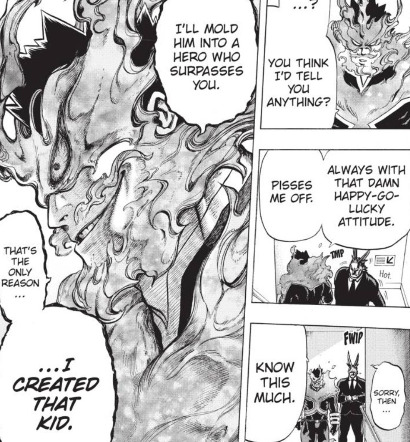
Endeavor’s mad science also literally has him treat the woman in his life as tools to use for his own amibition. He fores a marriage on a woman to use her as an unwilling accessory to his eugenics project.
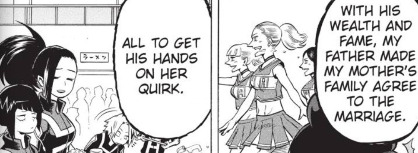
It is not specifically a story of ambition got wrong, it’s also a story of neglect and abuse of all the women in his life. Endeavor’s ambitions all center around personal greatness for him. Shoto will prove his worth as a hero, as a mentor to him, as a great father. The fact that his motives are entirely selfish, (Endeavor is not focused on being the best hero he can be, but rather his own desire to be the strongest) is something that has an affect on his family and children.
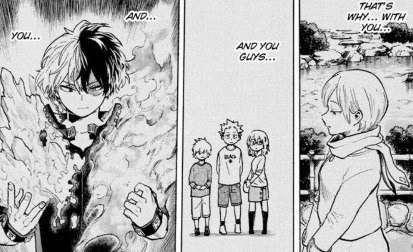
Fuyumi, Touya, and Natsuo are literally afterthoughts to Endeavor despite being just as much his children as Shoto. He literally only thinks of Rei in the context of “I needed her to give me a family.” Not only that but he’s also an extremely bad father to the one child that he does take an active role in trying to parent, acting extremely controlling towards Shoto and getting extremely angry whenever Shoto did anything that was outside of Endeavor’s wishes for Shoto to fulfill his ambitions.
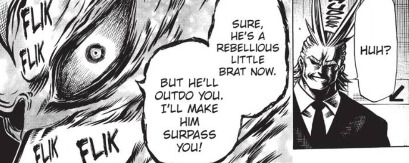
Endeavor just like Victor, inspires to greatness as a man and wants the signifiers of that as held up by society, accomplishment (Endeavor wants to be the number one rank even though he technically has far more resolved cases than All Might and the rank is literally just a number), family, and recognition despite having done none of the work. Once again why men great till they gotta be great. At the start of his arc, Endeavor feels entitled to Shoto’s love and obedience, and a role in his life, despite the fact that he’s hideously abused him for most of his life.
Endeavor like Victor, also abandons several children for failing to meet his expectations.

Part of Natsuo’s problem with Endeavor has exactly to do this sense of entitlement, Endeavor practically abandons his kids until they’re in their early twenties to the point where he wasn’t involved in their lives at all (and also separated them from their mother). Remember another point of the book is that Victor wants sole parenthood, to create life without involvement of a woman.
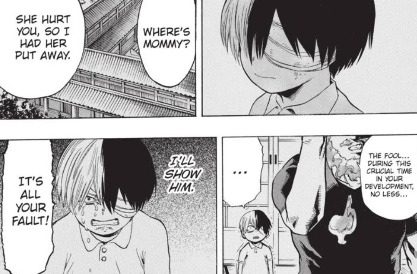
Endeavor does the exact same thing. He separates the children from their mother. Then while he is the only parent left in the household and effectively responsible for all of his children, he neglects most of them and completely fails to raise them.


It’s implied besides trying to teach Shoto to use his quirk, he’s literally pushed all of the housework, and actual parenting you know, labor that is involved in raising a child onto Fuyumi. Fuyumi has cooked most of Shoto’s meals, it’s Fuyumi who attends his school conference in the novels. Endeavor has effectively committed the same crime as Victor, creating life and then running away from it by failing to act in any way as the father to his own children. His sense of entitlement shows in his actions and the way he treats the people around him in his life, he uses them for his own ambitions and they get burned.
Endeavor is someone who has used all of the women in his life for his ambitions. Think Fuyumi, she grew up desperately wanting a family while having effectively no father and all contact cut off from her mother, and also had to take care of household chores and responsibility for both of her younger brothers. Think Rei, who has literally been institutionalized for ten years, and trauma from her experiences that haunts her to this day. Natsuo is someone who has no father, almost no relationship with his younger brother, and is still mourning his other dead brother. Shoto evens tates directly, he views Endeavor as someone to learn how to use his quirk from but hasn’t viewed him once as a father. Endeavor’s never been present as a father in Shoto’s life, despite controlling most of it and giving him all of the attention. He had ambition to pass his quirk from father to son, but never actually acted as a father.

Endeavor’s treatment of his family, and his reflection for his past actions is also shown using this metaphor for fire. All Might’s ambition to become the strongest hero for the sake of a more peaceful society, is also represented by fire. Especially a flame that he passes from one person to the next, that Nana passed to him, and he passed to Deku.

Endeavor is almost always associated with the more violent aspect of fire, when he thinks of the harm he’s done to his family it’s always juxtaposed to the fire on his face.



(The right side fire, the left side Rei’s suffering face.)
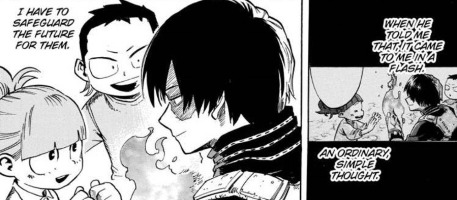
Whereas the more gentle associations with fire are almost made with Shoto. Once again the novel of Frankenstein doesn’t decry ambition, it merely explores the consequences of ambitions that were extremely self-interested from the start. Endeavor only wanted to be strong for his own sake. Shoto who wanted to become a hero like All Might who would never make his mother cry, and All Might who wanted to create a safer society are people with strong ambitions that are associated with gentler flames.
2. Dabi and Frankenstein’s Monster
Sins of the Father or Sins of the Fathers derives from biblical references primarily in the books Exodus, Deuteronomy, and Numbers to the sins or iniquities of one generation passing to another. Basically what it means is its a narrative trope where children are punished or suffer consequences for the action of their fathers. It can also mean that children inevitably reflect what their fathers have done to them, and even resemble their fathers.
Everything the monster does is a reflection of Frankentstein’s actions. Everything Dabi does is both a consequence and a reflection of Endeavor’s actions. They are both written as sons to be narrative foils to their creator. If anything Dabi is even more of a frankenstein’s monster than Shoto, because a key element to the narrative is that Frankenstein was abandoned for not being perfect according to his creator’s wishes, he was punished for a defect.

Touya just like frankenstein is a defective creation. One who suffers all of the consequences for what are his father’s sins. Endeavor deliberately took risks with his eugenics experiment that the child might have a quirk not compatible with their body, but it’s the child and not the parent who suffers all of the consequences. Toya literally died - whether he faked his death or not has yet to be revealed but he lost his home and family at a young age, spent most of his life homeless, and has to continually make use of a quirk that burns his entire body. Whether he wants them or not, his father’s sins are pushed onto Dabi.
The flame that Endeavor is so keen on passing to his children, has literally permanently disabled Dabi, and will negatively effect him for the rest of his life. Consequences that Endeavor ought to suffer are passed onto Dabi instead. Dabi is burned by Endeavor’s actions towards him.
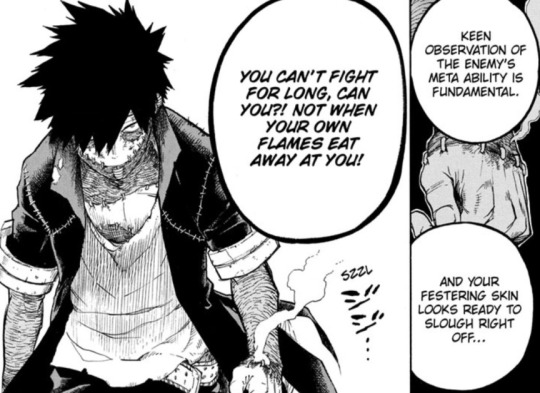
This is once again something deliberately brought up by the book Frankenstein. The doctor creates life, takes absolutely no responsibility and leaves his creature to starve to death in the wilderness, and then the first time they meet again calls upon his creation to die.
“I expected this reception,” said the dæmon. “All men hate the wretched; how, then, must I be hated, who am miserable beyond all living things! Yet you, my creator, detest and spurn me, thy creature, to whom thou art bound by ties only dissoluble by the annihilation of one of us. You purpose to kill me. How dare you sport thus with life?
The decision to create life irresponsibly was Victor’s, but the person who suffers the brunt end of the consequences is not Victor, but rather the creature itself who just like Dabi has no home, and is constistently hurt by the environment around him.
Dabi is also a symbol of the worst possible aspects of Endeavor’s ambitions.
To compare Victor and the monster briefly. Victor
Has family / friends
Home / Money / Wealth
Arrogant / Well Educated
Self-Destructive
A tool
The Monster
Abandoned
Ignorant (at first)
Homeless
A tool, but a more sympathetic one.
As you can see they are societally complete opposites. This can be said for Endeavor as well, he still gets to keep his family, his place in society despite what he’s done, he’s wealthy, succesful and well-liked in his community. Dabi is permanently disabled because of something his father did, is legally dead, homeless, separated from his family, and is a villain.
While they are completely opposite in status, the monster and Victor are eerily similiar. They are both highly intelligent people who carry a strong ambition within them. The Monster basically learns speech, and reading all on his own, and as soon as he can be becomes as well-read as possible.
Fortunately the books were written in the language, the elements of which I had acquired at the cottage; they consisted of Paradise Lost, a volume of Plutarch’s Lives, and the Sorrows of Werter. The possession of these treasures gave me extreme delight; I now continually studied and exercised my mind upon these histories, whilst my friends were employed in their ordinary occupations.
The monster also shares several of his father’s sin. He repeats the sins that have been done on to him, in the name of vengeance. Frankenstein’s claim is that he was hurt when he was still an innocent, punished before he had done anything wrong, but he also does the exact same thing to VIctor’s youngest brother killing him when he was just a child.
Victor’s worst sin by far is selfish entitlement, forgetting to consider the feelings of his creation. Yet, the monster knowing how much he suffered by just being created in a world where there’s no one else like him also demands Victor create another creature. This is out of his own personal sense of entitlement, he believes he’s entitled to have someone love him, and if he had this he would be a good person again.
He believes quite literally he deserves an Eve to share his loneliness in. His own personal feelings of grief and hurt matter more than those of: one the people he kills, and two a potential woman who would be created only to love him.
But it was all a dream; no Eve soothed my sorrows nor shared my thoughts; I was alone. I remembered Adam’s supplication to his Creator. But where was mine? He had abandoned me, and in the bitterness of my heart I cursed him.
The monster also feels entitled to punish Frankenstein, but in this reccuring sins of the fathers he punishes people who are completely innocent of the crime that Frankenstein did to him and have nothing to do with his creation, just to get back at Frankenstein. Including, an innocent boy, a maid who he framed for murder, Frankenstein’s friend, and also Elizabeth.
Dabi inevitably reflects his father and the environment he was raised in, and resembles him. Dabi who was raised by a quirk supremacist and thrown out because his quirk wasn’t good enough, kills people he doesn’t find worthy. Dabi’s methods are almost entirely based around his his individual strength because he was raised to believe that was the only good part of him. The same way Dabi was thrown out like burnable trash for failing to live up to his standards, Dabi will enact harsh vigilante justice and kill minor crimminals and heroes who fail to live up to his justice.

Just like for the monster’s actions in punishing Victor, Dabi is called to consider the feelings of family’s of the people he kills. He is also punishing people completely unrelated to what happened to him, in his efforts to hold his father accountable.

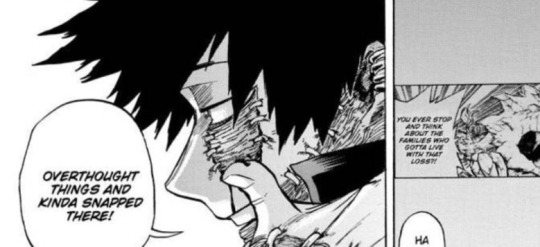
Dabi reflects his father, and quirk society the same things that burned him. He continually believes he has to be the strongest individually, accomplish everything on his own, and spurn others around him. Even those who try to make genuine connections with him like the league of villains. Dabi believes that the world has to be changed with the strength of ambitions of a single person, and his ambitions are far more important than the sense of family within the league.
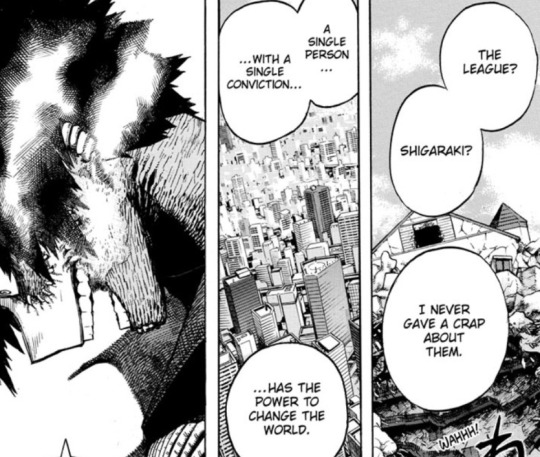
Dabi effectively distances himself from two families, the found family of the league, and also his original biological family. Think about how much it might save Natsuo to lean that his brother is still alive. Shoto at least, doesn’t want to see his father roasted alive on live television.
Dabi’s ambitions are as self destructive as his fathers, as he only knows how to fight by completely burning his body up. He harms himself over and over again by using his quirk to try to change things.
3. Endeavor and Ujiko
The book ultimately poses the question who is responsible for the actions of the monster, Frankenstein or the Monster itself. However, I think an element missed in a lot of analysis is that the mosnter accepts that most of what he has done is wrong, he just wants people to be held equally accountable for their actions.
“You, who call Frankenstein your friend, seem to have a knowledge of my crimes and his misfortunes. But in the detail which he gave you of them he could not sum up the hours and months of misery which I endured wasting in impotent passions. For while I destroyed his hopes, I did not satisfy my own desires. They were for ever ardent and craving; still I desired love and fellowship, and I was still spurned. Was there no injustice in this? Am I to be thought the only criminal, when all humankind sinned against me? Why do you not hate Felix, who drove his friend from his door with contumely? Why do you not execrate the rustic who sought to destroy the saviour of his child?
The monster’s problem is not that he shouldn’t be held accountable for his actions, but rather that he’s the only one whose ever held accountable for his actions. The Monster also spends most of the narrative being treated as a monster, whereas Frankenstein faces no real consequences for what he’s done from the people around him, never loses his standing in society, never is cast out for his wrongs. Frankenstein continually avoids any and all responsibility towards the monster up until his death, and only takes responsibility in violently trying to kill his creation.
There are also oppurtunities for Frankenstein to take responsibility, which he chooses not to do anything. An innocent maid is about to be executed for a crime that Frankenstein knows she did not commit, and instead of trying to help her by explaining to everyone his creation of the creature, and also that the creature is likely responsible for the murder he says nothing. While not responsible for the women’s death, he is culpable in that he could have taken action to save her but didn’t.
Franketnstein’s actions are again and again always to run away from the monster and avoid responsibility. From the beginning he runs away from the monster due to it simply being ugly. Both the monster (and also Toya) were punished when they were innocent children who had not committed any kind of crime, by the person who was responsible for raising them, educating them, and giving them everything they needed to become happy adults.
“Remember that I am thy creature; I ought to be thy Adam, but I am rather the fallen angel, whom thou drivest from joy for no misdeed. Everywhere I see bliss, from which I alone am irrevocably excluded. I was benevolent and good; misery made me a fiend. Make me happy, and I shall again be virtuous.”
While Frankenstein and the Monster both entitled, their reasons for entitlement come from entirely different places. Frankenstein’s comes from his own arrogance, believing that he’s destined to do great things, and be a man of status and accomplishment. Why men great till they gotta be great.
The monster believes he’s entitled to a family, because his father abandoned him, and he’s been homeless most of his life. The monster is violent, but only after he’s endured violence from people several times over. The monster is ultimately a victim of circumstance, and Frankenstein is the one who created that circumstance.
Considering Frankenstein and the monster are foils, there’s a reason that Frankenstein fears and abhors the monster before it’s even awake. It’s because the monster reflects the ugliness of his own actions. The ugliness in himself that he is completely unable to face. He is a negative character foil in a character sense, and a shadow created by Frankenstein’s actions.
The monster shows Victor what he is, selfish, entitled, and violent. Victor can’t ever confront the monster, because he can never confront those flaws within himself.
Dabi is a reflection of Endeavor’s violent, abusive nature. He is also the direct consequence of all of Endeavor’s actions. So the question is, has Endeavor confronted the monstrous side of his actions? The answer is most likely no, because despite doing things as bad as any villain in the story he still views himself as the hero.
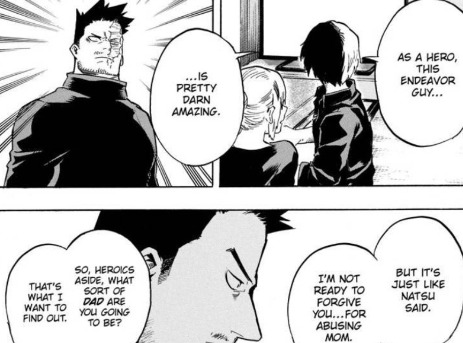
Shoto even tells us directly. Endeavor the hero and Endeavor the father are so different they’re almost like two different people. Endeavor continuing to be a hero on the television and coming home to his family is not taking repsonsibility for his actions, not truly, because he still hasn’t accepted the worst of what he’s done.

In the narrative Endeavor currently feels guilt, and also a desire to atone but we’re also told again and again that atoning means taking responsibility and carrying everything. No building a house where his family doesn’t have to be around him and taking steps to distance himself isn’t taking full resposnibility because Dabi is still running around. Dabi is the embodiment of the absolute worst of Endeavor’s actions, the toxic environment that literally killed Toya, burned Shoto, and hospitalized Rei. I would say Endeavor still hans’t seen the worst of his actions because he still views himself as the hero, just the hero who has made mistakes. We’re shown this in foiling, the same way Fankenstein rejects the monster, Endeavor doesn’t recognize Dabi even though he is literally his own son.

The strongest evidence of this is Endeavor and Ujiko’s foiling. They are two characters who have a lot in common, they both used children as experiments in their attempts to create stronger quirks including their own family members (Ujiko experimented on his own nephew).

They’re both men of incredible wealth and status in society, who have deliberately used their status to cover up their cimes. Endeavor used his status to hospitalize his wife for years, he used his status to marry her in the first place, Ujiko uses all of his money and resources to find people to experiment on, and deliberately takes advantage of people in need by using his orphanage and hospitals to farm for materials to make his Nomus with.
They’re both motivated by their own personal ambitions. They also feel entitled, Ujiko’s specific issue is that the scientific community failed to give him the respect and funding for his research that he thought he was owed.
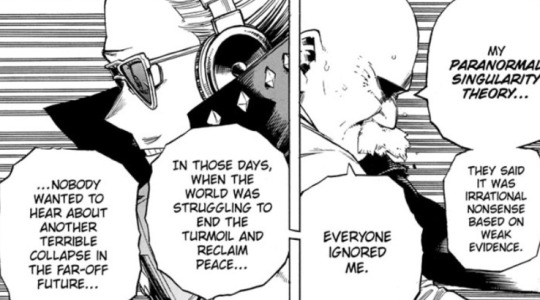
The source of Endeavor’s pain is that no matter how hard he works he’ll never become the strongest. The source of Ujiko’s pain is that nobody recognizes his work and achievements in his scientific community. They both want their hard work to turn into achievement, for their efforts to pay off, which again is not a bad thing until they get angry when they’re not given what they think they’re owed.
Ujiko and Endeavor both become so desperate to accomplish their ambitions that they manipulate people to become tools to fulfill their ambitions for them. Shoto has to carry on his legacy, and learn to use his flame side like Endeavor always wanted. They both create children that they are technically the parent of, but don’t act as fathers. Endeavor is responsible for Fuyumi, Natsuo, Touya, and Todoroki but fails to live up to that responsibility. Ujiko creates the Nomu, which just like the monster in Frankenstein are new life created from the corpses of other people, and then just uses them and disposes them as tools.
Ujiko even utters a line that is incredibly similiar to Endeavor in the regards to the way they treat Shigaraki and Shoto.


However how does Endeavor react to Ujiko? Does he understand the harm that he’s done in a new light? No, he falls back on his hero narrative. I am the hero, and Ujiko is the utlimate evil.

Endeavor so far, like Frankenstein, fails to truly confront the monster. Even when he finally realizes the destructive nature of his desire to be stronger than anyone else when he fights the Nomu, his response is to burn it alive. What is Endeavor’s response? To play hero, and defeat a villain.
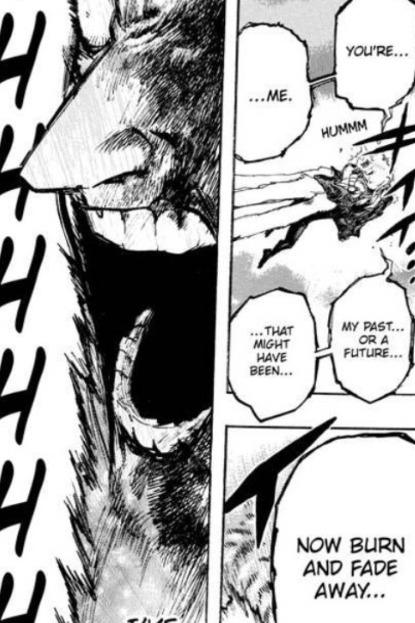
The thing about jungian shadow arcs is that you don’t destroy your shadow, you reintegrated it. Endeavor can’t symbolically murder his past self because that won’t make his past actions go away, he can only accept them. The question now is: will he do the same thing to Dabi?
When confronted with who Dabi is and his role in creating Dabi, what will Endeavor’s choice be? Is he going to play the hero, and destroy the villain he sees in front of him. The same way he did with the Nomu, the same way he did with Ujiko, the same way he’s trying to do with Shigaraki (who is, you know a heavy parallel to his own son Toya, and another abused child).

Will Endeavor act as a hero, or the remorseful father he also is? That choice is utlimately what Endeavor’s entire character is written around, does he want to finally be a father or does he want to keep being endeavor the hero? What is more important to him his own ambitions as a hero, or the people he’s harmed?
Just like Victor, Endeavor’s entire arc revolves around Dabi. He is a hero directly responsible for the creation of a villain. Dabi would not exist if it were not for Endeavor’s direct actions. Not only that but his future will be determined by how he chooses to interact with Dabi once he knows the truth. Endeavor cannot truly take responsibility until he takes responsibility for Dabi.
#mha meta#mha dabi#dabi is touya#dabi#enji todoroki#endeavor#frankenstein#mary shelley's frankenstein#Sometimes you gotta wake up in the morning and decide to spend your entire day writing an incredibly long essay about classic literature
230 notes
·
View notes
Note
thoughts on idk fave books? last movie you watched?
last movie: monster hunters. milla jovovich killing gigantic monsters with gigantic guns. MY SHIIIIIT, ari.
FAVE BOOK! Frankenstein! LETS COUNT THE WAYS SHALL WE
it’s the original inception. the whole thing is an account by Robert Walton AND it was proofread by Victor himself! so the format is: Walton’s letters, THEN his account of Victor’s story, and in THAT story is the account of the creature. PLUS the victor proofing. it’s... amazing
that’s not including the letters from Elizabeth and Alphonse (Victor’s father) so there are at least five narrators filtered via Robert via Victor!
Robert is writing all of this to his sister Margaret Saville-Walton. MWS. gosh Mary Shelley was just not fucking around with style
mws dedicated this book to her dad William and kills little William in the book and then her son William died shortly before the book is published :/ (she had a miscarriage before attending the villa ghost story night with Byron, so there’s a strong STRONG case of fertility/mothering/abortion reading of the text)
there are three editions of the book and they are thematically/stylistically different enough to feel like different versions: the 1816 first draft (my fave), the 1818 text with Percy’s additions/proofs/guidance and the 1831 text, the one everyone most likely read and uses. when mws went back (after her husband, her kids and friends had died) and infused a mega dose of religious into it all. I highly recommend reading all three!
there are A LOT of women in this book and adaptations just... forget: Caroline, Elizabeth, Justine, Agatha, Safie
victor never actually describes HOW he brings the creature to life so technically EVERY single adaptation is correct
my boy ERNEST FRANKENSTEIN is in the book from beginning to end and is the ONLY single Frankenstein to survive and literally NO ONE NOTICES! but I am so absolutely sure this was a stylistic choice by mws bc when he is mentioned it’s to counter victor. victor isolates himself and ignores everyone and stays inside. ernest is always outside, doesn’t go too crazy about education and is the comfort to Elizabeth and everyone (he even follows victor and Elizabeth on their sojourn after victor’s has his meltdown).
everything EVERYTHING in the story can be blamed on books and isolation :D Robert fell in love with adventure and sailing and ended up isolated in the arctic. Victor fell in love with alchemy and poetry and ended up isolated in his lab. The Creature loved Paradise Lost and obsessed over Victor’s journals and isolated himself. it’s not just knowledge is power is knowledge is not enough
THIS FUCKING QUOTE:
“The ancient teachers of science,” said he, “promised impossibilities and performed nothing. But the modern masters have indeed performed mira- cles. They penetrate into the recesses of nature and show how she works in her hiding- places. They ascend into the heavens; they have discovered how the blood circulates, and the nature of the air we breathe. They have acquired new and almost unlimited powers; they can command the thunders of heaven, mimic the earthquake, and even mock the invisible world with its own shadows.”
there have been A LOT of papers on the characters being analogs to Mary, Percy, Byron, and I absolutely agree with them, yeeeet I hold more to the whole book being mws dealing with her father’s neglect, her mother’s death, and her miscarriages, all of ti filtered through her absolutely genius brain. I love a lot the adaptations that include her and align her iwth the creature. it just... fits
there’s more these are just a few things!
#mystuff#frankenstein#mary shelley#my Frankenstein collection is sacred I have at least 50 versions#my dream is to own a first edition
11 notes
·
View notes
Text
as if, if. Pinks. dili rain.
obliguo imping es as if if et noe o not till enhet I 1 , as if If we make this Observation; they design’d to give some disturbance to 2 the Grass be Rotted, tangled or clung together. Also a Term or Gravelled, and to look after Sheep apply’d to Herbs, when they grow as if if the Weather prove Rainy, lest the they were Plaited together; as Matted Rot surprize them. Pinks. 3 I was informed [ that this play having been once acted, this personage when he came upon the stage ] appeared double, as if if the real 4 may dili rain de novo; as if If distress die 5 — supernatu umph, which [ ] as if if they knew the Hawkesburies 6 as if if therefore 7 was much the same as if If he were totally unacquainted with 8 the blood of the first purchaser; as if If a man hath issue 9 as much as if if 10 — reduction of their issues, as may be made without producing public inconvenience. — as: “if - If 11 of as if ( if within twenty days ) to these 12 his own interest: as if, if it was entered into 13 added to the discompo dicated as much as if if you will sure of 14 the same as deeply as if if I contract with 15 — nach as, as soon as, as if, if, however, till, untill, though, unless, when, while, ftatt des Verbi finiti gebraucht, 16 as if if any person within any 17 for ever, as if this were their rest and portion, and as if If any of our fallen race desire 18 “as if” if it shall be considered expedient 19
now without them; as if if they can that did it, for I neither can nor will. 20 — clearness and transparency (as if If it be bloody, there is probably a degree filtered) 21 And yet, [ ] after a pause, “I feel as if — if I were a while [ ], and leaves rustling over 22 numb and as if ! if the heart was constricted. bound 23
as if if had gone to sleep. Illic-an. 24 As if were if break-ing As if if break-ing hearts [ ] As if if 25 — the collocation of the words, the expression summarily, be the same in all respects as if “if any” refers to 26 duties as if if 27 As if if it was As if if it was for anything but 28 as if “if” was the word?—Yes. [ ] If they treat it as meaning “if,” [ ], which is nonsense. 29 I feel as if if I hadn’t 30
sources (through 1923); some (two) from 1923-39
1 OCR confusions at scan of mss, Logica maior Aristotelico-Thomistica (BSB Clm 27849 b; 1694) : 1178 Bavarian State Library copy, digitized July 17, 2014 2 OCR cross-column jump, ex The British Apollo, or, Curious amusements for the ingenious. To which are added the most material occurences foreign and domestick. (London, December 1st. to 3rd., 1708) : 46 wonderful index to this volume, which is discussed (with other advice columns and their forebears, Daniel Defoe’s Little Review among them) at wikipedia 3 OCR cross-column misread (entries for “Matted” and “May”) in Dictonarium Rusticum, Urbanicum & Botanicum. Or, a Dictionary of Husbandry, Gardening, Trade, Commerce, and all Sorts of Country-Affairs. Volume II. Illustrated with a great Number of Cutts. (Third edition, revised... London, 1726) : 65 by John Worlidge (1640-1700 *) and Nathan Bailey (d1742 *) 4 OCR misread (showthrough noise), ex Jean-Jacques Rousseau, “An Epistle to Mr. D’Alembert,” in The Works of J. J. Rousseau (Vol. 3, of five, London 1767) : 174 5 OCR cross-column misread (for “distrain”), &.c., at Thomas Leach. Modern Reports, Or, Select Cases Adjudged in the Courts of King’s Bench, Chancery, Common Pleas, and Exchquer, Volume the twelfth. Third edition, corrected. (London, 1796) : 646 6 OCR cross-column misread, at Cobbett’s Annual Register (December 18, 1802) : 795-96 7 OCR cross-column jump, at “Trial of Thomas Whitebread, and others, for High Treason” (1679) in Cobbett’s Complete Collection of State Trials... Vol. 7 (1810) : 319-20 8 ex “Debate in the Commons on Mr. Fox’s Motion for Leave to bring in his East India Bills. A. D. 1783,” in The Parliamentary History of England... vol 23 (tenth of May 1782, to the first of December 1783); (Hansard, London, 1814) : 1187-1213 (1195-96) aside — the State assuming debt of (and responsibilities of/for) the East India Company, and entanglements in / entrapment of the subcontinent... 9 OCR cross-column misread, at Thomas Walter Williams. A Compendious and Comprehensive Law Dictionary; elucidating the terms, and general principles of law and equity (London, 1816) : at Discent [sic] 10 ibid. (1816), similar misread at Bill of Exchange 11 OCR misread, show-through confusion, at “Second report on the expediency of the bank resuming cash payments” in The Pamphleteer 14 (London, 1819) : 24 12 Letter from L.S. re: Dr. Tomlinson’s Library, &c., in The Newcastle Magazine 4:1 (March 1821) : 393-396 (394) 13 ex Chapter 14, “Of a Lease,” in William Sheppard, The Touchstone of Common Assurances being a plain and familiar Treatise on Conveyancing. With copious notes, and a table of cases cited therein; to which is added, an appendix, and an extensive analytical index (by Edmond Gibson Atherley). 8th edn, Vol. 1 (London, 1826) : 270 14 ex “The Delights of a London Omnibus.” in The Bath and West of England Magazine (For March, 1836) : 88-90 15 OCR cross-column misread, at “Maxims of the Law. Law Tracts,” in The Works of Lord Bacon, with an introductory essay, and a portrait. Vol. 1 (of 2; London, 1837) : 544-570 (556) 16 ex notes to “My Fellow Clerk. A farce in one act,” by John Oxenford, in K.F.A.P. Thornhill, Englisches lesebuch, oder, Antleitung um auf die leichtfasslichste Weise das Englische schreiben und sprechen zu lernen... (Stuttgart, 1839) : 17 (similar at p44) 17 OCR cross-column misread, at definition of “Embezzlement,” in John Bouvier, A Law Dictionary, Adapted to the Constitution and Laws of the United States of America, and of the several states of the Amerian union; with references to the civil and other systems of foreign law. Vol. 2 (of 2; Philadelphia, 1839) : 358 on John Bouvier (1787-1851), consult wikipedia; in addition to being jurist and legal lexicographer, he was father of Hannah Mary Bouvier Peterson (1811-70 *), author of books on science, astronomy and cookery. 18 OCR cross-column misread, notes to James, chapter v, in Thomas Scott (1747-1821 *), The Holy Bible, containing the Old and New Testaments... with explanatory notes, practical observations, and copious marginal references. Vol. 6 (London, 1839) : 415 19 OCR cross-column jump, at “To the People of the State of North Carolina” (concerning handling and treatment of Black “servants”) in Volume of Speeches Delivered in Congress, 1840, Including Discussions of the Independent Treasury Bill, the Extension of the Cumberland Road, the Bankruptcy Bill, and Other Matters of National Finances (Stanford copy; 1840) : 6 20 OCR cross-column misread/jump, at Richard Baxter, “Gildas Salvianus. The Reformed Pastor; showing the nature of the pastoral work; especially in private instruction and catechizing: with an open confession of our too open sins. Prepared for a day of humilation kept at Worcester, December 4, 1655...” in The Practical Works of Richard Baxter : With a Preface, giving some account of the author, and of this edition of his practical works; and essay on his genius, works, and times; and a portrait. Vol. 4 (of 4; London, 1854) 353-484 (410) on Richard Baxter (1615-91) consult wikipedia 21 snippet view, evidently OCR cross-column misread at The Homoeopathic Echo : A Journal of Health and Disease (1855) : 200 22 snippet view, evidently OCR cross-column misread at Cassell’s Family Magazine (1875) : 163 the whole — And yet , “ Oh ! no , ” she answered , gravely , and for a little she continued after a pause , “ I feel as if — if I were a while both Amy and Winifred sat in silence , with the man I should choose some particular occupation , and leaves rustling over ... 23 OCR cross-column misread, at Lectures on Diseases of the Heart : With a Materia Medica of the New Heart Remedies. By Edwin M(oses). Hale., with A Repertory of Heart Symptoms by E. R. Snader. Third edition, greatly enlarged. (Philadelphia, 1889) : 338 something on Hale (1829-99) at sueyounghistories 24 OCR misread of “if” for “it,” ex entry “The Face. Sen / Sensation,” in William D(aniel). Gentry (1836-1922?), his The Concordance Repertory of the More Characteristic Symptoms of the Materia Medica. Vol. 1 (New York, 1890) : 800 25 OCR confusion over musical score, “The Swan and the Skylark, Cantata.” The words by Hemans, Keats, and Shelley; the music composed by Arthur Goring Thomas (posthumous work) (London and New York, 1894) : 49 score at IMSLP (International Music Score Library Project) on Arthur Goring Thomas (1850-92), see wikipedia 26 OCR cross-column misread, ex Justice of the Peace (London; April 23, 1898) : 272 27 OCR cross-column jump, ex “In re John Scott, Jun. (Deceased).” January 27, 1900. The Weekly Reporter 48 (1900) : 208 28 ex Horace Traubel, “I’m just talking all the time about love,” in The Conservator 21:5 (Philadelphia, July 1910) : 68-70 (69) some OCR cross-column confusion, involving these lines — As if if it was for anything but just love the whole and be deceived : business would not go to pieces : And so I am gagged and bound and put into As if if it was for anything but just love it could prison ... all tagged Horace Traubel (1858-1919) see also wikipedia 29 regarding “Clause 87” ? ex preview snippet (only), Sessional Papers (House of Lords), Volume 6 (1926) : 44 30 ex Fiction Parade and Golden Book Magazine (1936) full snippet preview — he stopped , of cool has come instead . It ’ s a sort of then went on haltingly , you said you calm feeling I have , like floating wouldn ’ t have thought badly of me through heaven on a cloud . I feel as if if I hadn ’ t . . . ” I were dead , as if everything ...
—
an aside (about method and motives) — as if, if it’s not been said before, an aside or error in some out-of-the-way obscurity, snatch of glanced breeze, there’s nothing, and so nothing to report.
3 notes
·
View notes
Photo

New Post has been published on https://techcrunchapp.com/frankensteins-castle-is-now-have-become-a-tourist-attraction/
Frankenstein’s castle is now have become a tourist attraction

Student of records and manual Cyrille has been taking me across the Swiss metropolis on a Frankenstein go to and the sculpture of the beast at Plainpalais, the web page in which it submitted its first homicide, was too acceptable a photograph occasion to miss.
Frankenstein is a specialty however developing fascination in Geneva, energized by the bicentenary of the beast’s creation. It was in June 1816, 200 years prior, that a gathering of five youngsters from England accumulated in an estate sitting above Lake Geneva and attempted to unnerve each other with apparition stories.
‘Waking dream’
According to the current travel stories blog, one of them, 18-year-old Mary Godwin, had a “waking dream” which she related one night and mesmerized her crowd, which incorporated the English sentimental writer Lord Byron.
Mary was joined by her future spouse, the 23-year-old artist Percy Shelley, who had relinquished his first wife and youngsters to abscond with Mary. They were all free-thinking bohemian spirits – what we would call today elective creative’s.
Byron urged Mary to record her frightening story; she began promptly and called it “Frankenstein or the Modern Prometheus.”
The best travel journal online blog stated A duplicate of that first release gazes me in the face. It’s one of the six creator’s duplicates Mary Shelley got herself and it’s brimming with comments; most would discover their way into the subsequent version.
Artistic summer
The Geneva-based Fondation Martin Bodmer, perhaps the greatest library of uncommon books on the planet is praising the bicentenary of Mary’s bad dream with a show. There are pictures, canvases, first versions, and original copies that clarify the foundation and reproduce the setting of that abstract summer.
Teacher David Spurr from the University of Geneva, the keeper of the show, fills me in.
He shows the 1816 meteorological records from Switzerland; the most extreme temperature in June fluctuated between 10-12 C (50-53 F). A manually written note says that even toward the month’s end “there was not a solitary leaf on the oak trees.”
Today Villa Diodati is exclusive; however, the delightfully manicured gardens are periodically open to general society.
Birches, pines, and lime trees ascend over the blended fragrances of rose nurseries, lavender supports, and columns of citronella hedges. Muscat plants encompass the manor slopes, as they did in Byron’s time; and somewhere out there the Jura Mountains rise delicately over Lake Geneva. The nurseries are a spot for motivation now as they were at that point.
In the estate, the youthful companions read a collection of German phantom stories by candlelight. At the point when that was finished, Byron urged them to develop shocking tales of their own.
This is the place where Mary Shelley came up trumps with her considerations of what might occur if a researcher-made life utilizing power. Tests with this new actual wonder were extremely popular at that point and individuals were especially captivated with its capacity to cause spasms.
Destroyed château
The top travel blog in usa stated In 1803 Giovanni Aldini, an Italian researcher broadly passed an electric momentum through the body of a balanced man before a welcomed crowd in London; the group thundered as his dead jaws started jerking and his inert appendages began moving.
Mary’s book was distributed to extraordinary well-known achievement, yet the primary version didn’t bear her name; the distributer accepted that deals would endure if peruses realized that it was crafted by a young lady.
Precision robots
The Shelleys cruised on the Rhine in transit back to London. It’s conceivable, yet obscure whether Mary had the opportunity to visit those two locales.
Teacher Spurr offers another alternative; he gives me a French volume by Francois Felix Nogaret, called “The Mirror of True Events” distributed in 1790.
Whatever the motivation, it’s Mary Shelley’s creation that turned into the object of our interest; she can legitimately call “Frankenstein” her own.
2 notes
·
View notes
Note
Questions from a new Romantic era fanatic: Why does everyone hate polidori and who the hell is keats?
Hello, dear anon, and welcome to the World of Romanticism! There is no turning back now. This post will be super long, so if you wanted short answers, I beg you to forgive me for that, but I wanted to write something consistent and detailed, with many links for further reading in case you (or anyone else) are interested. Just click on “keep reading” (if you’re on the web. I’m not sure if there is this option on the mobile app).
Well, people hate John Polidori because he was an asshole in Geneva. To give you a few examples of his ridiculous behaviours: during a sailing trip, he hit Byron’s knee with an oar — Byron turned his face away in pain. Polidori, instead of apologising, remarked that he was glad to see that Byron was capable of demonstrating emotions. Byron got so pissed he said that if Mary wasn’t on board, he would have thrown Polidori overboard. The situation, according to Thomas Moore, went like this: “Be so kind, Polidori, another time, to take more care, for you hurt me very much.” — “I am glad of it,” answered the other; “I am glad to see you can suffer pain.” In a calm suppressed tone, Lord Byron replied, “Let me advise you, Polidori, when you, another time, hurt any one, not to express your satisfaction. People don’t like to be told that those who give them pain are glad of it; and they cannot always command their anger. It was with some difficulty that I refrained from throwing you into the water; and, but for Mrs. Shelley’s presence, I should probably have done some such rash thing.“He also purposefully picked on Shelley. On Moore’s words, “Polidori had become jealous of the growing intimacy of his noble patron with Shelley”, and even wanted to duel him after he lost a sailing match. However, Shelley was a known pacifist. Byron, on the other hand, offered himself to duel Polidori, claiming that “though Shelley has some scruples about duelling, I have none and shall be at all times ready to take his place.” Anyway, here’s what the physician wrote about Shelley when they first met: “bashful, shy, consumptive; twenty-six; separated from his wife; keeps the two daughters of Godwin, who practise his theories;”There was also that one time when Polidori asked Byron “what is there you can do that I cannot?”. Byron’s answer was priceless: “I can swim across that river—I can snuff out that candle with a pistol-shot at the distance of twenty paces—and I have written a poem of which 14,000 copies were sold in one day.”
Judging by what I’ve read so far, I’d say the guy was such a pain in the ass, that Byron didn’t even trust him. On a letter to Hobhouse (June 23rd, 1816), he wrote: “that child and childish Dr. Pollydolly contrived to find it [a bottle of potash] broken, or to break it (…)”
Apparently he was a decent person only when he was around Mary, probably because he had a crush on her.
Anyway, Byron was no saint — I adore him (more than I should, probably), but I do know he was a complex person. However, Polidori was the worst, and Byron didn’t deserve that.
Polidori’s journal from 1816 is available online for free. If you wish to read it, you can find it here.Another useful link: Life of Lord Byron, Vol. 3 by Thomas Moore. Also, fun fact: his sister, Frances Polidori, married Gabriele Rossetti. Therefore, John Polidori was Dante Gabriel Rossetti’s and Christina Rossetti’s uncle (although he died before they were born).
And now to who the hell is John Keats Well, here we go…Born in 1795, John Keats was a working-class man — someone whose life was quite frustrating, and surrounded by death (he died at 25, but still outlived his parents, his grandma and his brother). He wanted to be a poet, and to be among the great English poets when he died. Therefore, he began writing around 1814 (if I am not mistaken), and his poems were filled with beautiful lines about nature, beauty, imagination and words about his muse, a young woman named Fanny Brawne.Most of his contemporaries, however, didn’t like his work — it is said that his poems sold barely 200 copies back in the day. Byron, for example, despised Keats as a poet — he used to criticize his poems, and once he even said Keats’ works were a sort of “mental masturbation”. He mentions Keats in Don Juan (Canto XI, stanza LX. He kinda mocks the myth surrounding his death*), as well as in his letters.Shelley, on the other hand, loved Keats, and wrote a massive elegy on his death, Adonaïs, which probably helped keeping Keats’ legacy alive. When Shelley drowned, his body was identified because he had a book of poems by Keats in his pocket. Ironically, Keats didn’t like Shelley that much.Unfortunately, Keats fate was not a fair one: he contracted tuberculosis, probably from his brother, who died of consumption in 1818. The symptoms got worse around 1820, so it was decided that he should retire to a warmer climate in order to survive. In November of the same year, he arrived in Italy. However, because Keats was medically trained, and had already seen people dying of tuberculosis, so he knew he was going to die soon. He knew exactly what was going on, and that moving to Rome wouldn’t work. He knew was doomed.The poor man died in Italy, of tuberculosis, at the age of 25, in 1821, believing he was a failure. He was the youngest of the English Romantics, and also the first one to die.Even though his life was quite bitter, he always did his best to see beauty in every thing that surrounded him — quoting his Endymion “a thing of beauty is a joy forever”; and quoting Keats himself (from a letter): “"If I should die,” said I to myself, “I have left no immortal work behind me - nothing to make my friends proud of my memory - but I have loved the principle of beauty in all things, and if I had had time I would have made myself remembered.“”.From the state his lungs were after his death (described by his friend Severn on a letter to Fanny: “the lungs were completely gone. The Doctors could not conceive by what means he had lived these two months.”), one can only imagine how much he agonized and suffered during his last days.He was buried at the protestant cemetery in Rome (same place as Shelley). On his tombstone, one can read “This grave contains all that was Mortal of a Young English Poet Who on his Death Bed, in the Bitterness of his Heart at the Malicious Power of his Enemies Desired these Words to be engraven on his Tomb Stone: Here lies One Whose Name was writ in Water. ”After his death, Fanny Brawne suffered a lot for about 8 years of her life.John Keats became quite successful a few years later, during the Victorian era, and his poems deeply influenced the pre-raphaelites, and even Tennyson. Nowadays, he is considered to be one of the greatest English poets, as he so ardently desired to be during his lifetime.If you wish to read his poems, I recommend Ode to a Nightingale, On Death, Ode on a Grecian Urn, When I Have Fears, La Belle Dame Sans Merci, Bright Star, Isabella or The Pot of Basil, and This Living Hand. You can read more about John Keats’ life here and here. You can read Keats’ letters here
*The Myth surrounding Keats’ death was that he died because of the stress generated by the harsh comments his poems received. Obviously, that was not the case…
And that’s it.
Thank you very much for asking! I hope you enjoyed my answers! If you, or anyone else has any other question about the romantics, you can ask me here.
#this was the longest ask i've ever answered#lord byron#percy shelley#john keats#john polidori#romanticism#a few typos here and there#I'm sorry? please ignore them
175 notes
·
View notes
Text
Mary Shelley’s Lake Geneva diary from August 2nd, 1816…
“Friday, August 2. — I go to the town with Shelley, to buy a telescope for his birthday present. In the evening Lord Byron and he go out in the boat, and, after their return, Shelley and Clare go up to Diodati; I do not, for Lord Byron did not seem to wish it. Shelley returns with a letter from Longdill, which requires his return to England. This puts us in bad spirits. I read Rêveries and Adèle et Théodore de Madame de Genlis, and Shelley reads Pliny’s Letters.”
This was the day that Percy, Claire, and Byron discussed Claire’s pregnancy and what they were going to do about custody rights. Shelley had already known about Claire’s pregnancy for at least a month and was most likely the first to know, since after he and Byron almost drowned on June 25th he had secretly written a will that left sums to Claire and any person of her choice — her name being near the top of the list along with Mary, his wife Harriet, and all his children. Considering that Byron later believed the Hoppner Scandal (unconfirmed rumours that Claire had a secret child with Percy which was given for adoption or aborted) — and that historians believe Claire and Shelley were probably sexually involved at various periods — some people believe that the paternity of the child was called into question. Claire’s identity as the child’s mother would be hidden from the public to protect her reputation, and Byron and Shelley both accepted responsibility for the child (though Shelley was arguably more attached), although everyone agreed that the child (Allegra) looked and acted like Byron, and was therefore his.
Byron in a letter to his sister about Claire and the rumours surrounding his time at Geneva:
“. . . as to all these ‘mistresses’ — Lord help me — I have had but one. Now don't scold — but what could I do? A foolish girl, in spite of all I could say or do, would come after me, or rather went before, for I found her here, and I have had all the plague possible to persuade her to go back again, but at last she went. Now, dearest, I do most truly tell thee that I could not help this, that I did all I could to prevent it, and have at last put an end to it. I was not in love nor have any love left for any, but I could not exactly play the Stoic with a woman who had scrambled eight hundred miles to un-philosophize me, besides I had been regaled of late with so many ‘two courses and a dessert’ (Alas!) of aversion, that I was fain to take a little love (if pressed particularly) by way of novelty. And now you know all that I know of the matter, & it's over.”
A decade later, Claire Clairmont wrote to Jane Williams:
“What would I not give to have an unhappy passion, for then one has full permission and a perfect excuse to fall into a happy one; one has something to expect, but a happy passion, like death, has finis written in such large characters in its face there is no hoping for any possibility of a change. You will allow me to talk upon this subject, for I am unhappily the victim of a happy passion. I had one; like all things perfect in its kind, it was fleeting, and mine only lasted ten minutes, but these ten minutes have discomposed the rest of my life.
The passion, God knows for what cause, from no faults of mine, however, disappeared, leaving no trace whatever behind it except my heart wasted and ruined as if it had been scorched by a thousand lightnings.“
Sadly, Allegra Byron died at the age of five due to a sudden outbreak of typhus in Romagna where Byron had enrolled her in a private convent school. This was a betrayal to Claire, as they had promised each other that Allegra should never be apart from one of her parents, due to Claire’s prediction that something terrible would happen if so. However, Byron argued that having a good Italian-Catholic education would give Allegra higher marriage prospects in Italy than any education she could have in England, partly due to her illegitimacy and partly due to the tarnished reputations of the Byron/Shelley/Godwin households, among other reasons. Claire blamed Byron for Allegra’s death, and she felt that while Shelley sympathized more with her, Mary sympathized more with Byron. Three months later, Shelley followed Allegra to the grave, and the already fragmented social circle would further break apart.
#mary shelley’s 1816 journal#english literature#literature#romanticism#poetry#lord byron#aesthetic#dark academia#history#writing#percy shelley#claire clairmont#jane williams#mary shelley#geneva#lake geneva#lac leman#switzerland#villa diodati#romantics#poets#letters#journals#biographies#frankenstein
71 notes
·
View notes
Photo
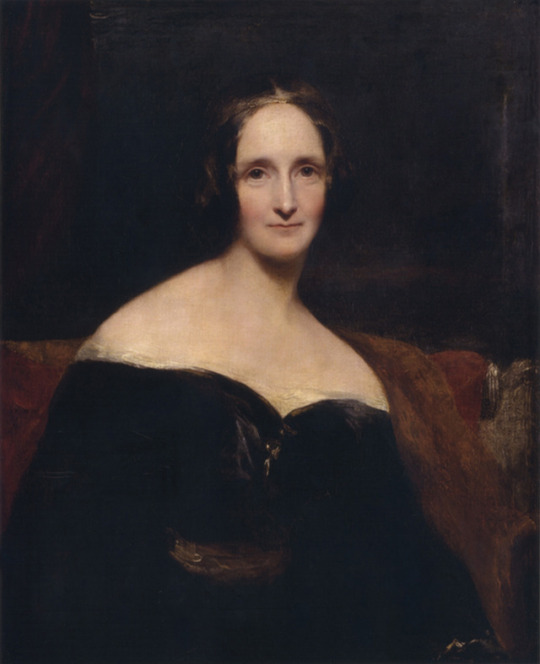
Women’s History Month - Mary Shelley
Mary is most often known as the author of Frankenstein, but much more happened in her full and fascinating life:
Mary Shelley was born on August 30th, 1797. She grew up in a politically radical family: her mother, Mary Wollstonecraft, has been referred to as the mother of feminism, and her father, William Godwin, was called the father of anarchism.
In 1814, Mary met her father's friend, Percy Shelley. After their meeting, Shelley wrote: “I do not think that there is an excellence at which human nature can arrive, that she does not indisputably possess...” They began to meet in secret, and while visiting her mother’s grave with Shelley, Mary confessed her love to him. Her journal reports that they lay on the ground and touched each other with “the full ardour of love”. Early in the morning on the 28th of July 1814 Mary and Shelley eloped to France.
In 1816, while holidaying in Geneva in a group including her husband and Lord Byron, Mary began work on what would become her most famous novel, Frankenstein, which was published in 1818. Mary was just 19 at the time.
Shelley died in a boating accident in 1822, along with his friend Edward Williams. In the aftermath of their deaths, Mary grew close with Edward’s widow, Jane Williams. In 1824, Mary wrote in her diary: “To her for better or worse, I am wedded...” She dreamt of earning enough from her writing to support Jane and both their children.
Mary was also a friend to other queer people in her life. In 1827, she helped her friend Isabel Robinson elope with the writer Doddy - who was assigned female at birth, but lived the rest of their life as Isabel’s husband, Walter Sholto Douglas.
Mary continued to write, publishing several more books – often on the themes of women's role in society, and championing their independence from men. She died, age 53, on February 1st 1851, and was buried in the Shelley family vault. Percy Shelley’s heart, plucked from his funeral pyre on an Italian beach and carried by Mary in her writing desk for the rest of her life, also rests there.
Check out our podcast to learn more!
79 notes
·
View notes
Text
Frankenstein Adaptations Are Almost Never Frankenstein Adaptations
https://ift.tt/346GA1J
In an age of adaptation, we still don't have a faithful adaptation of Mary Shelley's classic genre novel.
facebook
twitter
tumblr
Mary Shelley's gothic novel Frankenstein is a story constantly being retold — but almost never has it been retold faithfully. In 2015, we got Victor Frankenstein, the latest in screen adaptations bearing the Frankenstein name, but having little to do with the original text.
This habit of less-than-faithful adaptations of Shelley's work goes back a long time. The history of Frankenstein adaptations is the history of hodgepodge narrative parts continually being stitched, torn, and re-stitched back together into an amalgamation of what has come before. But, when "before" is 200 years of stage and screen adaptations, source material and inspiration bleed together, and the "original" becomes distorted — like a game of temporal telephone.
But past the narrative convolution that comes with the passage of time, Frankenstein has seemingly always been a text that eschews faithful adaptation. From the very beginning, on the stage and as one of the first films ever made, Mary Shelley's original vision of a man and the creature he created has rarely been its own...
How Frankenstein Came to Be
For those with an interest in English literature, feminism, or the birth of modern science fiction, perhaps the story of how Frankenstein came to be is as famous as the book itself. The basic tale was first written down by an 18-year-old Mary Shelley (then Mary Wollstonecraft Godwin) in 1816 while she and lover/future husband Percy Shelley were visiting Lord Byron in Switzerland.
Dubbed “The Year Without a Summer,” the eruption of Mount Tambora had the Europe of 1816 in the clutches of a volcanic winter, leaving the idle group with little to do in the form of outdoor recreation while staying near Lake Geneva.
read more: The Bleeding Heart of Dracula
Instead, the literary colleagues took to reading German ghost stories to one another, leading to the challenge that they each pen their own ghost story. And thus, one of the first works of modern science fiction was born. Frankenstein, as a full novel, would be published anonymously two years later on New Year's Day in 1818.
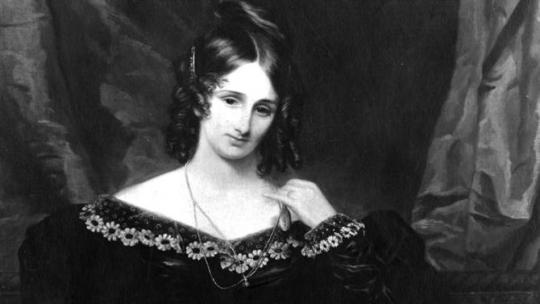
Do you Know the Story of Frankenstein?
For those unfamiliar with the source material, Frankenstein is an epistolary novel, told in a series of letters from Captain Robert Walton to his sister, as well as in his journal entries (it should be noted that this narrative framing very rarely makes it into screen or stage adaptations).
Glory-driven Walton is on an Arctic expedition when his crew finds a cold and broken Victor Frankenstein. They pull him aboard, and Dr. Frankenstein relays the story of the monster he created to Walton--the monster he is pursuing across the ice.
youtube
It is a story of creation and abandonment and family. The Creature is arguably much more of the heroic, sympathetic protagonist here than Frankenstein, whose sin is not in playing God (though some have made that argument) but rather in leaving his creation alone in a confusing, cruel-to-difference world.
Unlike so many of his on-screen interpretations, the Creature of the novel is eloquent, thoughtful, and — at least at first — inspired by the beauty of the natural world. Later, he uses his gift for language to articulate his anguish, telling Frankenstein, "I am content to reason with you. I am malicious because I am miserable. Am I not shunned and hated by all mankind? You, my creator, would tear me to pieces and triumph; remember that, and tell me why I should pity man more than he pities me?"
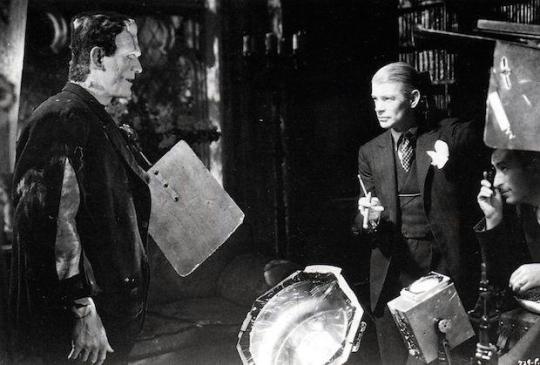
The First Frankenstein Plays and Movies
If none of this plot or backstory sounds familiar, it’s probably not your fault. (Well, you could read Frankenstein, which is one of those classics that holds up remarkably well.) Most screen adaptations pick and choose what they want from the original material, more often drawing inspiration from the 1931 movie starring Boris Karloff than Mary Shelley.
read more: 13 Forgotten Frankenstein Movies
But a full two decades before director James Whale made the iconic horror film, Frankenstein was already a movie star — in fact, the story was one of the first committed to film. Frankenstein's adaptation to the screen happened roughly a decade after cinema itself was invented, making this self-admittedly "liberal adaptation" from Edison Productions one of the first movies ever.
Video of FRANKENSTEIN (1910 Edison Production) HD
One of the notable changes form the novel in the 12-minute film is a happy ending for Frankenstein and his new wife, Elizabeth (spoiler alert: in the book, the Creature kills Elizabeth on their wedding night, and Frankenstein himself later dies on the ice. Pretty bleak).
Of course, the decision to make Frankenstein into one of Edison's earliest motion picture productions did not happen in cultural isolation. There is an adaptation path to be traced between the publication of the novel and the creation of films like this 1910 classic and the 1931 version.
According to this Film School Rejects article, 1823 — the first year Frankenstein was adapted to the stage — had five separate plays on the stage. It was these early stage adaptations that first introduced the character of Victor Frankenstein’s assistant Fritz, who would later evolve into the Igor we know from so many later movie adaptations.
youtube
The Boris Karloff film actually drew inspiration from a 1927 stage play by Peggy Webling, rather than the novel itself. And, moving forward into the era of such classics like Young Frankenstein or not-classics like the recently-released Victor Frankenstein, one could easily argue that most subsequent Frankenstein adaptations have more to do with James Whale’s 1931 film — and its 1935 sequel The Bride of Frankenstein — than they do with Shelley’s work.
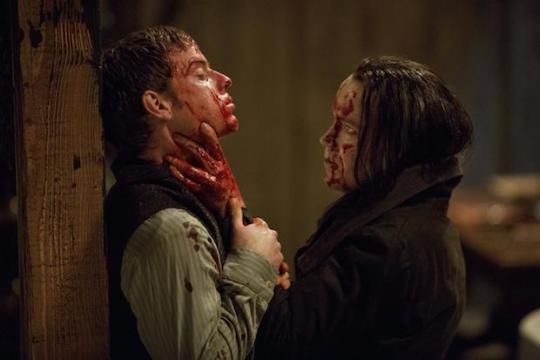
The Most Faithful Adaptations to Mary Shelley's Frankenstein
Though many Frankenstein adaptations are more interested in the 1931 film or some action-oriented blockbuster (yes, I, Frankenstein, I'm looking at you), there have been attempts at a more faithful version over the years.
Kenneth Branagh took a stab at a faithful retelling of Frankenstein with his 1994 film Mary Shelley's Frankenstein. The movie does a slightly better job articulating the nuances of the Creature than most other adaptations, but still falls short of the mark. The film also changes the ending in a particularly jarring way, not only bringing the Creature's bride to life, but giving her Elizabeth's head and memories. Yikes.
youtube
David Crow makes a good argument on this site that Penny Dreadful's interpretation of the Creature in the form of Caliban is one of the most faithful versions of the character ever brought to screen.
Everything from the Monster's raven hair to his loquacious love for John Milton was transferred to television in tact. However, if you're looking for an adaptation that not only takes on the iconic character, but the full story, I would recommend the National Theatre's stage version undertaken in 2011.
British film director Danny Boyle brought Frankenstein to the stage starring Benedict Cumberbatch and Jonny Lee Miller. The two well-known actors alternated the roles of Victor Frankenstein and the Creature every performance, creating a more literal thematic connection between the two characters. Two sides of the same coin. Two creatures eventually brought down by their guilt, hate, and anger.
youtube
The production was a relatively close adaptation of the original novel (with the problematic addition of a rape scene), and was broadcast to cinemas around the world through National Theatre Live, meaning that this adaptation, in some sense, was also a screen one.
However, the performance has yet to be released on DVD and, according to the theater, never will be if the play's creators have anything to say about it. The Powers That Be prefer that the ephemerality of the performance be preserved. One can only hope this means Frankenstein will find its way to cinemas again for more encore performances.

Why Does Frankenstein Resist Faithful Adaptation?
Why is Frankenstein so rarely adapted with a sense of fidelity? One need look no further than the earliest stage adaptation — Presumption: or the Fate of Frankenstein (1823) — to at least partially answer that question. Chris Baldick's book In Frankenstein's Shadow details how the play made great efforts to appease conservative backlash (many found the novel subversive and atheistic).
read more: A History of Frankenstein Comics
The production was nonetheless boycotted by a "friends of humanity" group, prompting the play's management to release the following statement: "The striking moral exhibited in this story is the fatal consequence of that presumption which attempts to penetrate beyond prescribed depths, into the mysteries of nature."
Furthermore, director Richard Brinsley Peake introduced the Frankenstein's assistant character who "prepares the audience to interpret the tale according to received Christian notions of sin and damnation by telling them that 'like Dr Faustus, my master is raising the devil.'"
Almost two centuries later, Daniel Radcliffe plays an incarnation of this character designed to explain to the audience how they should feel about Frankenstein's playing God in Victor Frankenstein.
youtube
The Importance of the Female Perspective
As the daughter of anarchist philosopher William Godwin and feminist Mary Wollstonecraft (who died 11 days after Mary's birth), Mary Shelley was a fascinating woman, one with much to say in a culture not-so-interested in what women had to say about it.
One of the reasons Frankenstein so endures is because of its examination of the arrogance of man and the failings of a world without empathy — a theme that, of course, can be explored by anyone, but one that doesn't seem to get a lot of play in works undertaken by privileged white men.
It seems important to note, at this point, that most of the Frankenstein adaptations (though certainly not all) have been undertaken by men who are perhaps less culturally-motivated to consider the more traditional way life is brought into this world. After all, due to the limitations Western society places on both genders, while science has historically been a man's domain, child-rearing has, historically, been a woman's.
Journalist Sady Doyle recently responded to Victor Frankenstein director Paul McGuigan's recent assertion that Mary Shelley's original work is "dull as dishwater," by outlining the convincing theory that Mary Shelley wrote Frankenstein as a sort of revenge for her sister Fanny (given name: Frances), who was abused for being illegitimate and eventually killed herself, writing in her suicide note: "You will soon forget there was ever such a creature as..."
There are many interpretations of the Frankenstein story — many of them autobiographically-based. This is one of the reasons it is such a good story. But a parent's neglect and the toll it plays not only on the child, and everyone in his life, is certainly a central one. And one that is often neglected in Frankenstein adaptations in favor of exploring the themes of science, nature, and man's hubris specifically in relation to his work. These interpretations are not mutually exclusive, but the latter is often valued over the former.
It is perhaps easy to look at Frankenstein, and its two male protagonists, and to adapt it with little attention to the importance of women and other socially-devalued characters in the story. After all, they are all periphary characters. But they are the characters who suffer the most. Or at least the ones who suffer the most with the least amount of power to change their fates.
Victor and his Creature are constantly suffering, but they have created their own suffering and have many chances to alter their own destinies. Elizabeth and the Creature's female companion are never granted that same power.
youtube
The Future of Frankenstein Adaptations
As this Den of Geek article points out, faithfulness does not equate to quality. Some of the most faithful screen adaptations of books are the worst, while some of the least faithful adaptations can become something better. There are too many variables involved, too many possible permutations to make sweeping generalizations. And, in the world of Frankenstein adaptations, for example, Whale's 1931 film remains the classic, one that continues to influence culture in its own important ways.
However, it would be nice to get a modern Frankenstein adaptation that is more readily available than Danny Boyle's stage version and more complete than Penny Dreadful's Creature — if only for all the high school English teachers who need something to show when they are out sick.
Sadly, as far as I know, there are currently no faithful Frankenstein adaptations in the works. What is happening in the Frankenstein adaptation world? Recently, a whole lot of biopics about Mary Shelley. In 2017, Elle Fanning played the author in Mary Shelley, a conventional biopic that told the story of the relationship between the young author and Percy Shelley, as well as the ways in which Mary Shelley felt out of step with her time. The film boasted a female writer, Emma Jensen, female producers, and a female director, Haifaa Al-Mansour (Wadja).
Elsewhere, HBO Max has ordered a series called The Shelley Society from Riverdale/Sabrina showrunner Roberto Aguirre-Sacasa. The series will depict a young version of Mary Shelley, who moonlights as a hunter of monsters and supernatural threats (including a manifestation of Mary’s own literary creation, Frankenstein’s Monster).
Perhaps a continued interest in Mary Shelley's fascinating life will eventually drum up some excitement for a more faithful retelling of her most famous story. In the mean time, we'll have to make do with what we've got: one of the best genre novels of the last few centuries.
Kayti Burt is a staff editor covering books, TV, movies, and fan culture at Den of Geek. Read more of her work here or follow her on Twitter @kaytiburt.
Read and download the Den of Geek NYCC 2019 Special Edition Magazine right here!
facebook
twitter
tumblr
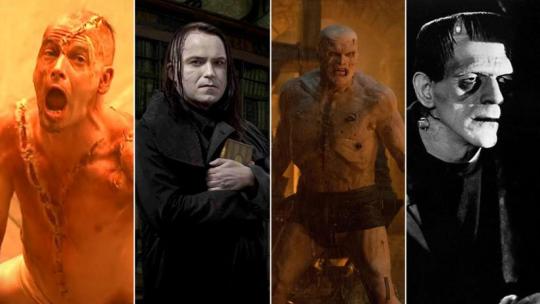
Feature
Books
Kayti Burt
Nov 21, 2019
Frankenstein
Mary Shelley
Boris Karloff
Horror Movies
31 Days of Horror
from Books https://ift.tt/2NhOpee
1 note
·
View note
Text
Fiction: Godwin, or The Modern Prometheus
An essay by Captain Jack Passerday, as told to Dave D’Alessio Art by Luke Spooner
11 Nov 1824
My dear Wilhelm:
I am writing to you as my solicitor in order that I may place into your hands certain information that may someday have value to the public at large. I ask you to retain this privately in the event that I meet with some form of malicious misadventure, at which time you may place it into the hands of the authorities as you see fit.
You are certainly aware, Wilhelm, that I, and my ship and crew have recently returned from our unsuccessful attempt to navigate the Northwest Passage. This failure, and the hardships it entailed, has been described at length in the Annals of the Explorers Society and so I will not bore you with it. Instead, I wish to describe for you an unusual event that we met with at the outset of our voyage.
As you know, we put forth from Dover in June of 1821. At the time, the prevailing winds were such that I decided to take the ship into the North Sea, up the Scandinavian coastline. It was while we were in easy view of Tromso that we spied a single boat, quite small and inappropriate to the rigors of the open sea, and apparently empty. As we closed on it, however, we saw a man lying insensible in the bottom who, by dress, was clearly no Norwegian fisherman, as he wore a black cutaway jacket and top hat rather than the usual heavy sweater and knit cap.
He was brought aboard, where our ship’s doctor, the estimable Surgeon Kaye, pronounced his condition the result of starvation and exposure. The unfortunate man found a large and powerful hot toddy more than stimulating, and after he had consumed it in its entirety, along with a good handful of ship’s biscuit, he felt sufficiently revived as to tell us why we had found him as we had.
After introducing himself as a physician from London, one John Polidori, he explained that his intention had been to row north until he was lost at sea and perished. I asked what might drive a reasonable and sane man, for he seemed both reasonable and sane at the moment, to such an act, and his exact response was, “I can no longer bear the secret that I hold within my breast.” Thus he began, and from there went on with a story so unlikely that if my Lieutenant and Surgeon had not also heard very much the same, I would have doubted my own sanity.
~
Doctor Polidori said:
It was in June of 1816 that I was installed in the household of George Gordon Noel Byron, that is, Lord Byron, the preeminent poet of our age. He was currently summering at the Villa Diodati overlooking Lake Geneva, a large and open building with a broad veranda well sited and designed for enjoying the vista of the lake as surrounded by the Alps.
Alas for all of us, you recall the summer of 1816 was particularly dreadful in terms of weather. Rain accompanied by thunderstorms was general, and when there was no rain, skies were none-the-less overcast for the largest part. At times the precipitation was so precipitous that we were confined entirely to the Villa and left to our own devices in terms of entertainment.
In that latter regard, we were in great and good company. A former paramour of Lord Byron’s, the aspiring actress and singer Claire Clairmont, joined us, and had brought with her her step-sister and, for lack of a more delicate term, her step-sister’s lover. He was Percy Bysshe Shelley, known as the author of Queen Mab, and Alastor, or the Spirit of Solitude, and a rising literary light. As for the step-sister herself, she was perhaps even more formidable. At the time, Mary Wollstonecraft Godwin was of but eighteen years of age, but like her name, she was clearly the product of two formidable parents, her father, William Godwin, the radical philosopher, and her mother, Mary Wollstonecraft, the noted essayist on the rights and abilities of women.
It was, of course, I who filled our party out to five.
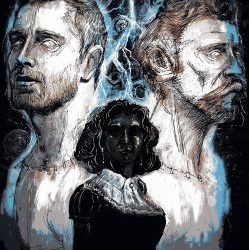
But the time came that the apparatus was perfected. All we needed do was await the next thunderstorm.
To read the rest of this story, check out the Mad Scientist Journal: Summer 2019 collection.
Captain Jack Passerday, RN, Member of the Explorer’s Society, served with distinction during the Napoleonic Wars, being promoted from Ensign to Commander. Following his unsuccessful voyage in search of the Northwest Passage (1821-1824), he and his crew disappeared during a search for Hawaiki, the legendary home of the Polynesian peoples (1827-?), presumably during a tropical typhoon. The attached manuscript was found among the papers of Wilhelm Cheatham, Esq., upon the dissolution of his firm Howe, Dewey, Cheatham Associates in 2018.
Dave D’Alessio is an ex-industrial chemist, ex-TV engineer, and ex-award-winning animator currently masquerading as a social scientist. His more than twenty previously published stories include “The Twenty-Year Reich,” finalist for the Sidewise Award for best alternative history short story of 2017, and “Jack the Giant-Killer: A Species Traitor?” in Mad Scientist Journal, Volume CXCVIII, August 2015.
Luke Spooner, a.k.a. ‘Carrion House,’ currently lives and works in the South of England. Having recently graduated from the University of Portsmouth with a first class degree, he is now a full time illustrator for just about any project that piques his interest. Despite regular forays into children’s books and fairy tales, his true love lies in anything macabre, melancholy, or dark in nature and essence. He believes that the job of putting someone else’s words into a visual form, to accompany and support their text, is a massive responsibility, as well as being something he truly treasures. You can visit his web site at www.carrionhouse.com.
“Godwin, or The Modern Prometheus” is © 2019 Dave D’Allessio Art accompanying story is © 2019 Luke Spooner
Fiction: Godwin, or The Modern Prometheus was originally published on Mad Scientist Journal
1 note
·
View note
Text

MARY SHELLEY & PERCY SHELLEY
Years active: 1812--1822
MARY...
Mary Shelley, author of Frankenstein, was the daughter of the radical philosopher William Godwin, who described her as ‘singularly bold, somewhat imperious, and active of mind’. Her mother, who died days after her birth, was the famous defender of women’s rights, Mary Wollstonecraft. Mary grew up with five semi-related siblings in Godwin’s unconventional but intellectually electric household.
Mary’s childhood had elements of Cinderella, complete with a malevolent stepmother. Her father got remarried after the untimely death of her mother, to Mary Jane Clairmont, a widow with two young children. The new Mrs. Godwin favored her children over Mary and was jealous of William’s attention to her. She made life difficult for Mary and promoted her children’s education at the expense of Mary’s. Despite Mrs. Godwin’s efforts, Mary received an excellent education. She had access to her father’s library, listened to his discussions with other leading intellectuals, and immersed herself in her late mother’s writings. Due to clashes with her stepmother, Mary was sent to live with the Baxter family in Scotland. Here she finally found a loving family, and began to focus on her writing.
PERCY...
Percy Shelley enjoyed a life of privilege, and was sent to Eton College when he was twelve. After six years at Eton, where he became known for his anti-authoritarian views and began writing poetry and prose, he entered Oxford University in 1810. At Oxford he and a friend, Thomas Jefferson Hogg, influenced each other’s growing rejection of societal rules. Their collaboration on a pamphlet titled The Necessity of Atheism resulted in their expulsion from Oxford. Percy’s father, angered by his expulsion and refusal to renounce the pamphlet’s atheist ideas, cut him off financially until he came of age two years later. While living in poverty, Percy eloped with sixteen-year-old Harriet Westbrook.
LOVE NEVER DIES...
On a visit home in 1812, fifteen-year-old Mary met Percy Shelley, an admirer of her father. Percy visited the Godwin home often, and became friendly with Mary, whom he recognized as an intellectual soulmate. Percy resented that his wife Harriet, preoccupied with one child and pregnant with another, no longer made him the center of attention.
In 1814, Mary and Percy began meeting each other secretly, as William Godwin forbade the relationship [after Percy fell through in bailing him out of debt]. They had a series of rendezvous at Mary Wollstonecraft's grave in St Pancras Churchyard, and they fell in love—she was 17, he nearly 22. On 26 June, Shelley and Godwin declared their love for one another as Shelley announced he could not hide his "ardent passion", leading her in a "sublime and rapturous moment" to say she felt the same way. On either that day or the next, Mary lost her virginity to Percy, famously consummated near the grave of her mother.
Soon after, the couple left for France with Mary’s stepsister, Claire Clairmont. The trio traveled throughout Europe reading the works of Mary’s mother, keeping a journal of their travels, and developing their own writing.
By the fall of 1814, money had run out and they were forced to return home. To further complicate matters, Mary discovered that she was pregnant. Mary tried her best to maintain a normal lifestyle despite a sickly pregnancy but it is rumored that during this time Percy began an affair with Claire. Little evidence supports the claim, however; several sections of Mary’s journals are missing from the period, Claire’s journal has disappeared, and Thomas Hogg--Percy’s friend and biographer--does not include a history past 1815. In any case, Mary was frequently left alone while Shelley visited his wife or engaged in outings with Claire.
February of 1815 proved devastating for Mary, as her daughter was born two months premature and died two weeks later. Percy’s apathy towards the loss of their child compelled Mary to search elsewhere for comfort and she turned to Thomas Hogg for companionship. It is often thought that Percy encouraged a relationship between Mary and Hogg, especially after his own alleged affair with Claire. Mary had no interest in a romantic relationship beyond Percy, however.
In May 1816, Mary, Percy and their son William, born the same year, traveled to Geneva where they spent the infamous ‘summer without sun‘ in the company of Lord Byron, Claire Clairmont and John William Polidori, Byron’s physician. The tranquil, bleak and desolate atmosphere was inspiration for a group of young poets and writers. What started as a challenge to write a ghost story, turned into a hauntingly magnificent novel, Frankenstein. Mary was just nineteen years old when she wrote the novel, but in the companion of such geniuses as were Byron and Shelley, she had not dared to present them with a less haunting story. Published anonymously in 1818 with a preface by Percy, it became one of the most popular works of the Romantic period.
Percy and Mary returned to England in 1816 to face back-to-back tragedies. Mary’s half-sister committed suicide and a few weeks later, Percy’s wife, Harriet, killed herself. Harriet’s death allowed Percy and Mary to wed. Percy’s efforts to gain custody of his two children with Harriet were blocked by her family’s claims that his poetry [especially free love and atheism promoted in the political epic Queen Mab] showed him to be an unfit parent. In March of 1818, the Shelleys settled in Italy, where Percy became part of an expatriate artistic community centered on Lord Byron. There, Percy wrote some of his best work: Prometheus Unbound, “Ode to the West Wind,” “The Cloud, “To a Skylark,” and “Ode to Liberty.” Sadly, their two children, William and Clara, died a year apart, in 1818 and 1819. Mary gave birth to a son, Percy Florence, in November 1819.
By 1822, the Shelleys had settled on the Bay of San Terenzo in Italy. They were joined by Edward Williams and his wife, Jane. Mary, who had inherited her mother’s melancholic streak, became depressed and isolated after the loss of her children. Percy, disappointed in his marriage, began a flirtation with Jane and wrote several poems to her. Still, Shelley expressed Mary’s isolation from him:
“My dearest Mary, wherefore hast thou gone,
And left me in this dreary world alone?
Thy form is here indeed--a lovely one
But thou art fled, gone down a dreary road
That leads to Sorrow’s most obscure abode.
For thine own sake I cannot follow thee
Do thou return for mine.”
On 8 July, Percy and Edward Williams set out on a sailing trip with their eighteen-year-old boatboy, Charles Vivian. They never reached their destination. A letter arrived to Mary addressed for Percy, saying, "pray write to tell us how you got home, for they say you had bad weather after you sailed monday & we are anxious". Mary and Jane Williams rushed desperately to Pisa in the fading hope that their husbands were still alive. Ten days after the storm, three bodies washed up on the coast near Viareggio. Byron and friends cremated Percy Shelley’s corpse on the beach.
Mary devoted herself to caring for Percy Florence, the only one of her five children to reach adulthood. She was also dedicated to maintaining her husband’s literary legacy. She collected and edited Percy’s poetry and wrote his biography. She continued to write the rest of her life, and was able to provide Percy Florence with an excellent education at Harrow and Cambridge University. Mary died of a brain tumor in February of 1851.
MARY SHELLEY is CLOSED. PERCY SHELLEY is OPEN !
13 notes
·
View notes
Photo


@little-bloodied-angel ooooh boy
Sometimes I forget this isn’t my main blog, which is much more history and literature merry 😂
So full disclosure, this is a very loose, roundabout connection. But Mary Shelley (at this time Mary Wollstonecraft Godwin) wrote the first draft of Frankenstein in 1816, while holidaying with her not-yet husband Percy Shelley at their personal friend Lord George Gordon Byron’s vacation home in Geneva, Switzerland. Also there was Mary’s half sister Clare Claremont and Byron’s personal doctor, John Poladari.
By the time the Shelleys arrived in Geneva, Byron and Poladari had been there for a while already, and during that period something had… happened. We don’t know, we will probably never know exactly what. But these two dudes who’d left England on pretty alright terms now couldn’t stand each other, and bickered constantly. Prime example ->
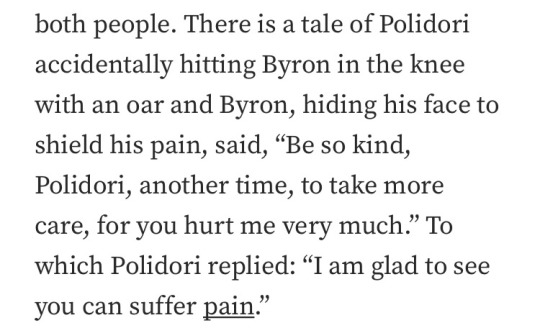
As a professional Byron hater, this story makes me so happy.
Despite Poladari’s (I’m sure totally valid) issues with Byron, Mary and Percy got along with him great, and the three would remain friends. And while, obviously not all books are completely based on authors personal lives and acquaintances, it’s long been theorized that Mary S took at least partial inspiration for the character of Victor Frankenstein from her husband and, more importantly in this case, Byron, as the two share numerous traits (manic depressive, cousin fucker, etc).
Not long after leaving Geneva, Poladari would pen a short story, The Vampyr, about a young man who is emotionally abused by a vampiric lord in what is strongly coded to be an abusive gay relationship.
Totally unrelated, numerous sections of Poladari’s journal chronicling his travels with Byron were later destroyed by the man himself. I’m not going so far as to say that the two had an affair, but… well, something happened there.
Anyway, cut to several decades later, and Bramjamin Stoker is writing Dracula. During his sort of… prep phase? Writing pre-production? He researched numerous vampire legends, both real (like the at-that-point-recent New England vampire panic) and fictional (like Carmilla). And of course, it still being a popular story, that included John Poladari’s The Vampyr.
So it is a very, VERY loose connection. But if you want to be pedantic about it (which I always do), then both Victor Frankenstein and Count Dracula are technically both, in some small way, inspired by the same early 19th century fuckwit.



Van Helsing, 2004, dir. Stephen Sommers
49 notes
·
View notes